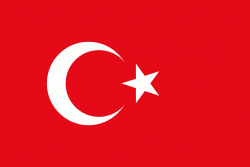Gevaş
Gevaş (Ոստան, Westan ) is a district of Van Province of Turkey. It is located on the south shore of Lake Van. In the last elections of March 2019, Murat Sezer from the Justice and Development Party (AKP) was elected Mayor. As Kaymakam, Hamit Genç was appointed by President Recep Tayyip Erdoĝan in July 2019.
Historically, Gevaş was for some time the main town of the Armenian kingdom of Vaspurakan and later between the 14th and 15th centuries the centre of a small Kurdish emirate. In their time the settlement had moved nearer to the lake. Later the town was incorporated in the Ottoman Empire. Before World War I, the district had a Muslim majority with a large Christian Armenian minority.
Main sights include surviving ruins of the castle, the monumental tomb known as Halime Hatun Kümbeti, built in 1358, very likely for the daughter of a local emir, a mosque built before 1446 (restoration in that year), the tomb of Sheikh Ibrahim, father of Halime Hatun as well as the ruins of an Armenian church in Ili, probably built after 941 and an Armenian Church/monastery on Kuşadası Island west of Aghtamar Island.
Historically, Gevaş was for some time the main town of the Armenian kingdom of Vaspurakan and later between the 14th and 15th centuries the centre of a small Kurdish emirate. In their time the settlement had moved nearer to the lake. Later the town was incorporated in the Ottoman Empire. Before World War I, the district had a Muslim majority with a large Christian Armenian minority.
Main sights include surviving ruins of the castle, the monumental tomb known as Halime Hatun Kümbeti, built in 1358, very likely for the daughter of a local emir, a mosque built before 1446 (restoration in that year), the tomb of Sheikh Ibrahim, father of Halime Hatun as well as the ruins of an Armenian church in Ili, probably built after 941 and an Armenian Church/monastery on Kuşadası Island west of Aghtamar Island.
Map - Gevaş
Map
Country - Turkey
 |
|
| Flag of Turkey | |
One of the world's earliest permanently settled regions, present-day Turkey was home to important Neolithic sites like Göbekli Tepe, and was inhabited by ancient civilisations including the Hattians, Hittites, Anatolian peoples, Mycenaean Greeks, Persians and others. Following the conquests of Alexander the Great which started the Hellenistic period, most of the ancient regions in modern Turkey were culturally Hellenised, which continued during the Byzantine era. The Seljuk Turks began migrating in the 11th century, and the Sultanate of Rum ruled Anatolia until the Mongol invasion in 1243, when it disintegrated into small Turkish principalities. Beginning in the late 13th century, the Ottomans united the principalities and conquered the Balkans, and the Turkification of Anatolia increased during the Ottoman period. After Mehmed II conquered Constantinople (Istanbul) in 1453, Ottoman expansion continued under Selim I. During the reign of Suleiman the Magnificent, the Ottoman Empire became a global power. From the late 18th century onwards, the empire's power declined with a gradual loss of territories. Mahmud II started a period of modernisation in the early 19th century. The Young Turk Revolution of 1908 restricted the authority of the Sultan and restored the Ottoman Parliament after a 30-year suspension, ushering the empire into a multi-party period. The 1913 coup d'état put the country under the control of the Three Pashas, who facilitated the Empire's entry into World War I as part of the Central Powers in 1914. During the war, the Ottoman government committed genocides against its Armenian, Greek and Assyrian subjects. After its defeat in the war, the Ottoman Empire was partitioned.
Currency / Language
| ISO | Currency | Symbol | Significant figures |
|---|---|---|---|
| TRY | Turkish lira | ₺ | 2 |
| ISO | Language |
|---|---|
| AV | Avar language |
| AZ | Azerbaijani language |
| KU | Kurdish language |
| TR | Turkish language |















